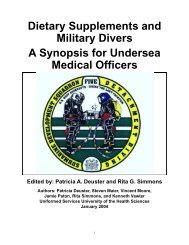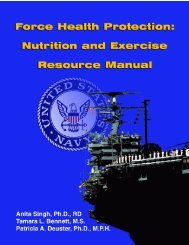Traumatic Brain Injury and Effects of Altitude - Human Performance ...
Traumatic Brain Injury and Effects of Altitude - Human Performance ...
Traumatic Brain Injury and Effects of Altitude - Human Performance ...
You also want an ePaper? Increase the reach of your titles
YUMPU automatically turns print PDFs into web optimized ePapers that Google loves.
<strong>Traumatic</strong> <strong>Brain</strong> <strong>Injury</strong> (TBI) <strong>and</strong> <strong>Effects</strong> <strong>of</strong> <strong>Altitude</strong>:An Analysis <strong>of</strong> the Literaturedehydration, <strong>and</strong> extreme temperatures. We reviewed the available clinical literature to capturecontemporary findings, strategies, <strong>and</strong> recommendations relevant to these concerns.Although the overall body <strong>of</strong> research literature remains limited, when taken together it providescompelling evidence that altitude exposure itself is a risk factor for some degree <strong>of</strong> potentiallypermanent neurological damage as evident on MRI. Although such damage might not later be clinicallyobservable as functional impairment at sea level, it represents the effects <strong>of</strong> processes consistent withthose which underlie secondary brain injury after TBI. As such, altitude-related neurological changessuggest that TBI patients may be relatively more vulnerable to secondary brain injuries at high altitude.Whether by exacerbation <strong>of</strong> underlying pathophysiological processes or by cumulative effect, TBIrelatedsequelae are probably worsened to some degree by exposure to high altitude <strong>and</strong> resultinghypoxia.This reinforces the importance <strong>of</strong> rapid evacuation <strong>and</strong> descent with careful attention to mitigatingother sources <strong>of</strong> physiologic stress. Military medical air crews are highly experienced in trauma casualtycare <strong>and</strong> management, but sometimes are forced to perform under very dem<strong>and</strong>ing <strong>and</strong> sometimesunexpected circumstances. To avoid complications, minimize secondary injury <strong>and</strong> promote goodoutcome, it is especially critical that TBI patients avoid exposure to hypoxia, hypotension, <strong>and</strong>hyperthermia in the immediate aftermath <strong>of</strong> injury. There is a pressing need for additional research <strong>and</strong>instructive case reports to document risks, benefits, interventions <strong>and</strong> outcomes associated withmilitary aeromedical transport <strong>of</strong> TBI casualties.Based on our review, there is little question that hypoxia itself – whether as the result <strong>of</strong> high altitude ortraumatic injury processes – is a strong predictor <strong>of</strong> poor outcome in TBI. Studies included in this reviewidentified clear adverse effects <strong>of</strong> hypoxia on morbidity, disability, neuropsychological/cognitivefunction, daily life functional status <strong>and</strong> morbidity among TBI patients. Taken together, they underscorethat a single episode <strong>of</strong> hypoxia is potentially dangerous <strong>and</strong> should be avoided by treatment withsupplemental oxygen. However, it is important to note that hypocapnia <strong>and</strong> hyperoxemia are alsopotentially dangerous to TBI patients. Recent findings indicate that while careful airway management<strong>and</strong> controlled oxygenation are important, TBI patients should not be hyperventilated in the pre-hospitalsetting unless there are clear signs <strong>and</strong> symptoms <strong>of</strong> brain herniation due to elevated ICP.With rare exception, clinical studies show that elevated ICP (> 20 mmHg) <strong>and</strong> hypotension (< 90 mmHg)also play a critical role in determining outcome from brain injury. Both events reduce cerebral bloodflow, leading to hypoperfusion <strong>and</strong> ischemia. Therefore, CPP (MAP minus ICP) may be the mostinformative variable for study. Ischemic brain damage can occur if CPP falls below 70 mmHg <strong>and</strong> CPPless than 60 mmHg is associated with poor outcome. Additional research is needed to determinewhether the incidence or impact <strong>of</strong> these alterations might vary by TBI severity level. We found onestudy (Manley et al., 2001) indicating a potential correlation between hypotension <strong>and</strong> brain traumaseverity. Our search on these variables revealed no clinical studies involving mild TBI (mTBI) patientcohorts.Hypotension can be provoked or aggravated by dehydration, which progresses faster at higher altitudes.Dehydration can compromise the body’s ability to compensate for injury-related fluid loss. In one study,low fluid balance (< 594 mL) was found to be an even more powerful independent predictor <strong>of</strong> poor TBIoutcome than ICP (Clifton et al., 2002). Fluid resuscitation <strong>and</strong> management is thus important not onlyto prevent hypotension itself, but also to correct for potentially dangerous blood sodium abnormalities,September 14, 2010 24



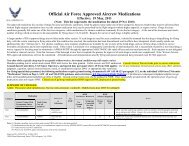
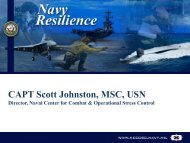
![Body Composition and Military [PDF] - Human Performance ...](https://img.yumpu.com/43269347/1/190x245/body-composition-and-military-pdf-human-performance-.jpg?quality=85)
![Tips for Grocery Shopping [PDF]](https://img.yumpu.com/37447379/1/190x245/tips-for-grocery-shopping-pdf.jpg?quality=85)
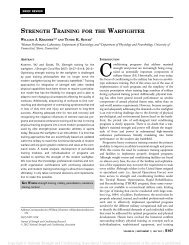
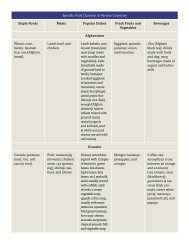
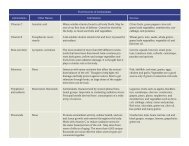
![Synthetic Drugs [PDF] - Human Performance Resource Center](https://img.yumpu.com/37447322/1/190x245/synthetic-drugs-pdf-human-performance-resource-center.jpg?quality=85)
